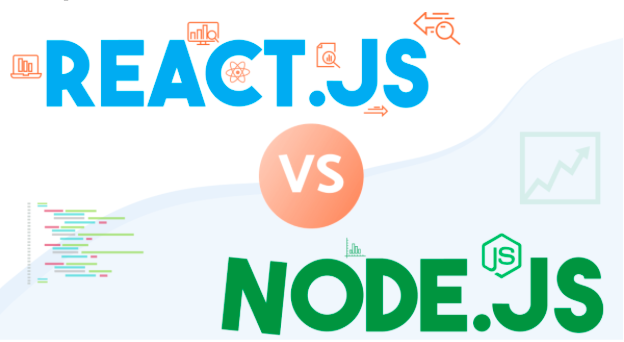Node.js vs React.js — A Detailed Comparison
The emergence of Node.js and React.js has revolutionized the field of web development. While both technologies have unique features, deciding which one to use can be confusing.

Ultimately, the choice between Node.js and React.js will depend on your specific needs as a developer or business owner. If you want to build server-side applications and handle large amounts of data efficiently, a reliable Nodejs development company may be the right choice.
Overall, This article provides an in-depth comparison between the two frameworks, including their strengths and weaknesses. As a result, you can decide which platform suits your project, or business needs best.
Whether you're a seasoned developer looking to improve your skills or an entrepreneur trying to build a new application, this detailed analysis will help you understand the advantages and limitations of both Node.js and React.js.
Comparison: Node.js & React.js
Node.js and React.js are two popular frameworks in web development, offering unique features to developers.
Node.js is a runtime environment for JavaScriot that executes JavaScript code without a web browser. It makes an attractive option for creating server-side applications.
Meanwhile, React.js is a JavaScript library that builds dynamic user interfaces with reusable components.
While both platforms provide benefits in their respective areas, there are notable differences between them that must be considered when choosing which one to use for a particular project. For example, Node.js has strong support for handling large amounts of data and can handle heavy traffic more efficiently than other platforms.
In contrast, React's powerful component-based architecture allows developers to create complex user interfaces quickly and easily.
Ultimately, the decision on whether to use Nodejs or Reactjs Development company will depend on your specific needs as well as factors like the expertise of your team members or budget limitations.
However, understanding the strengths and weaknesses of each platform is crucial when determining which technology stack will best meet your requirements in terms of scalability, performance and efficiency.

Advantages of React.js
React.js is a popular JavaScript library that offers various advantages to web developers.
One of the most significant benefits of using React.js is its component-based architecture, which allows developers to create reusable UI components across multiple pages or applications. This makes maintaining and updating complex user interfaces easier, improving code organization and reducing development time.
Another advantage of React.js is its fast rendering speed due to Virtual DOM implementation. This feature allows the platform to manage updates and reduce unnecessary re-renders efficiently, resulting in faster loading times and improved performance.
Additionally, React.js has an active community with regular updates and comprehensive documentation. It makes it easier for developers to learn from other professionals' experiences or get assistance when facing challenges during their projects' development phase.
Advantages of Node.js
Node.js has several advantages that make it a popular choice for software developers.
Firstly, it allows for seamless integration with other JavaScript frameworks and libraries, making it easy to build customized web applications using the same language throughout.
Additionally, Node.js uses an event-driven architecture which enables asynchronous processing of requests leading to faster response times for users.
Another significant advantage of Node.js is its scalability. As a Nodejs development company, you can take advantage of the platform's ability to support horizontal scaling, which allows for the easy distribution of tasks across multiple servers or cores in a cluster.
Disadvantages of Node & React
Despite their many benefits, Node.js and React.js also have some drawbacks that developers should be aware of before choosing either platform for their projects.
One of the main disadvantages of using Node.js is its single-threaded architecture, which can make it difficult to handle tasks that require extensive computation or server-side rendering. This limitation can lead to performance issues and slow response times when executing complex tasks.
On the other hand, while React.js is a popular choice for creating interactive user interfaces, it has some limitations in handling back-end operations, such as managing databases or service requests. Developers may need to integrate additional libraries or use alternative technologies alongside React to fully meet their application's needs.
Additionally, React's steep learning curve and constantly evolving ecosystem may pose potential challenges for less experienced developers.
Despite these disadvantages, both Node.js and React.js remain widely popular among developers due to their ability to streamline web development processes and improve overall efficiency.
Conclusion

Node.js and React.js are both powerful technologies with their unique strengths and weaknesses. Node.js is excellent for building scalable server-side applications that handle large amounts of data, while React.js excels at creating dynamic user interfaces that respond quickly to user interactions.
Ultimately, the choice between the two will depend on your specific needs as a developer or business owner. If you are considering building a web application using React.js, it's important to choose a reliable Reactjs Development company to help you leverage this powerful technology's full potential.
Overall, it's clear that both Node.js and React.js have transformed how we approach web development today. By understanding what each platform offers and weighing their pros and cons against your project requirements, you'll be better equipped to decide which tool is best suited for your needs.
